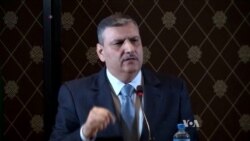Prospects for a political resolution to Syria’s crisis have dimmed after the main opposition group pulled back from U.N.-facilitated talks with the Syrian regime and called on the International Syria Support Group for help.
The opposition High Negotiations Committee blames the Syrian government for an uptick in fighting that has occurred since the two sides agreed on a cease-fire.
During a Tuesday news conference in Geneva, opposition chief coordinator Riyad Hijab urged the 17-nation International Syria Support Group to intervene.
“They can look into and re-evaluate the humanitarian procedures followed and undertaken and also to evaluate the cessation of hostilities, which has ended,” he said.
In a statement, the opposition said it would pause its participation in the political talks in Geneva because of concerns about the Syrian government’s “truce violations.”
In a bid to bolster its claims that President Bashar al-Assad's regime is responsible for the bulk of the violence, the group issued a new statement, on Tuesday, blaming the regime for air strikes that it said killed 40 people in northwest Syria.
"Assad is telling the world he has no interest in diplomacy for peace," said the High Negotiations Committee.
Secretary of State John Kerry and foreign ministers in the International Syria Support Group have had several rounds of talks but the U.S. acknowledges that challenges remain.
“I don’t think that we would characterize these talks as anything other than the difficult endeavor that they have always proven to be and that they will continue to prove to be,” said State Department spokesman John Kirby.
Some analysts doubt the U.S. and other world powers in the support group, however, have the leverage needed to get talks back on track.
Some say the prospects for the world powers to breathe life into the Syria talks are dim, unless there are changes on the ground.
“Unless you have some military changes on the ground in Syria will Assad and his backers feel the need to compromise. And until they do so, there is no way the opposition is going to agree to keeping in power the person who is responsible for the death of close to half a million Syrian citizens,” said Adam Ereli, a foreign policy analyst and former U.S. ambassador to Bahrain.
There also is concern about a perceived lack of buy-in, on both sides, concerning the political talks.
“Both sides have to be convinced that they can do better by going to a political outcome than by continuing the violence and I am pretty sure that the regime does not feel that way and I doubt that the opposition, or major portions of it, feel that way,” said Daniel Serwer, director of the Johns Hopkins conflict management program.
Syria’s crisis is among the issues on the agenda for Secretary of State John Kerry, who will be accompanying President Barack Obama this week at a Gulf Cooperation Council meeting in Saudi Arabia.






